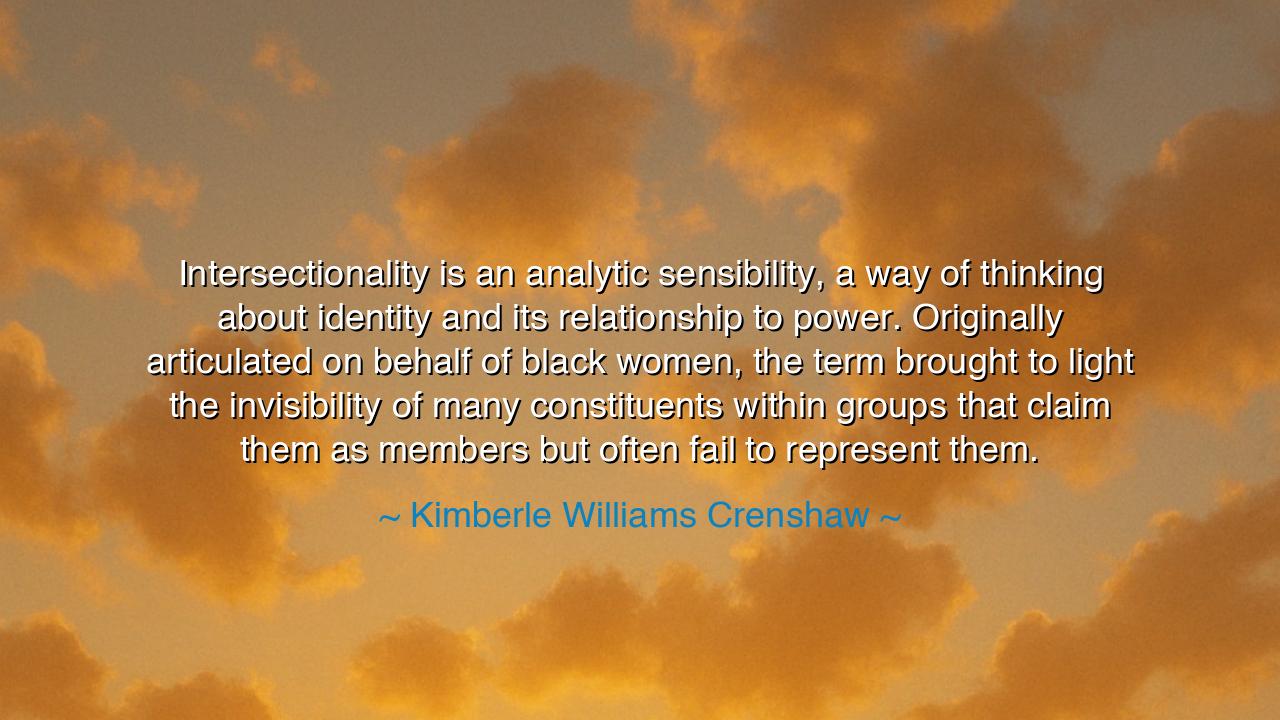
Intersectionality is an analytic sensibility, a way of thinking
Intersectionality is an analytic sensibility, a way of thinking about identity and its relationship to power. Originally articulated on behalf of black women, the term brought to light the invisibility of many constituents within groups that claim them as members but often fail to represent them.






The words of Kimberlé Williams Crenshaw — “Intersectionality is an analytic sensibility, a way of thinking about identity and its relationship to power. Originally articulated on behalf of black women, the term brought to light the invisibility of many constituents within groups that claim them as members but often fail to represent them.” — strike like a beacon in the modern age. With them, Crenshaw gave name to what had long been lived but unnamed: the overlapping struggles of those who bear more than one mark of oppression. Her voice carved clarity out of confusion, reminding the world that justice cannot be partial or blind to complexity.
The meaning is profound and necessary. Intersectionality is not merely a theory but a lens, through which we see how identity is shaped by race, gender, class, sexuality, and more. It reveals that oppression is not simple, but layered; that a black woman, for instance, does not experience racism and sexism as separate battles, but as one entwined storm. To ignore this reality is to make her invisible, erased even within movements that claim to speak for her.
History offers the very soil from which this truth grew. In the struggles of the civil rights era, the voices of women like Ella Baker and Fannie Lou Hamer were often overshadowed by male leaders, though their labor and vision were essential. In the feminist movements of the 20th century, the concerns of white middle-class women often dominated, leaving women of color, working-class women, and queer women unseen. It was into this silence that Crenshaw spoke, naming intersectionality so that the unseen might finally be seen.
The power of her words lies also in their rebuke of complacency. To fight only for a single axis of justice — race without gender, or gender without class — is to leave many behind. True liberation must consider every crossing of oppression, lest freedom become the privilege of the few. Power is not evenly distributed, and only through this broader vision can the chains of inequality be fully broken.
Let this wisdom endure across generations: seek not only the obvious injustices, but also the hidden, the layered, the quiet forms of exclusion that silence the most vulnerable. Crenshaw’s gift was to show that to achieve true justice, one must widen the circle of sight. Her words are a call to courage, to humility, and to vigilance — that no identity be forgotten, and no soul be left in the shadows of invisibility.






MHNguyen Cao My Hanh
This quote makes me reflect on how important it is to recognize the diversity within groups that are already marginalized. Are we inadvertently reinforcing systems of exclusion when we fail to acknowledge the intersections of identity? How can we move beyond token representation and genuinely listen to those who have been historically silenced?
PAPhuong Anh
It’s fascinating that Crenshaw connects identity with power in her discussion of intersectionality. How can understanding the intersections of race, gender, and other factors change the way we approach social justice? What steps can organizations take to ensure that those at the margins of a marginalized group aren’t ignored in the pursuit of equity?
TLUyen Nhu Tran Le
Crenshaw's quote speaks to a vital issue: the erasure of certain experiences within larger social movements. Intersectionality is more than just an analytical tool; it’s a call for inclusivity and awareness. Are we truly addressing the needs of everyone in movements that claim to represent marginalized communities, or are we still leaving some voices behind?
VCVy Cam
Kimberlé Crenshaw’s definition of intersectionality highlights the importance of recognizing the nuanced experiences of marginalized groups. How can we ensure that all voices within a group are heard, particularly those that are often overlooked? Is it enough for movements to simply acknowledge this invisibility, or must they actively prioritize these voices in their leadership and actions?